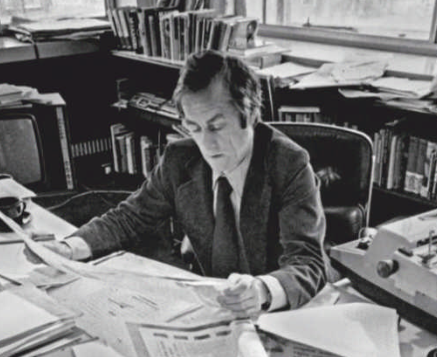If the legal route was barred by injunctions or contempt of court, he made his cause a moral one. He ran the story over several pages under a banner headline, and week by week found a new human angle to keep it going. It became unignorable that way, and grew into a problem that had to be resolved. He would not stop until it was. Beside the text he ran photographs that were equally powerful, daring the reader to look away: Don McCullin’s unsparing portraits from war zones, or the dangling body-harness of a thalidomide child.
如果法律途徑因禁制令或藐視法庭而受阻,他就把他的事業變成了道義上的事業。他以通欄標題連載這篇報道好幾頁,一周又一周地從一個新的人的角度讓它繼續下去。這樣一來,它就變得不可忽視,并發展成為一個必須解決的問題。他是不會罷手的。在文字旁邊,他放了幾張有同樣震撼力的照片,讓讀者不敢看別處:唐·麥卡林對戰爭地區的無情描繪,或者薩利多胺兒童懸在空中的身體吊帶。
He spent hours at the back bench, poring over pictures and layout to get that vital impact. Many thought him the most powerful editor in Britain well before the Times. It was a pretty good outcome for a northern working-class boy, the product of a state school, who had felt ashamed for years of not speaking like the BBC. He was proud of his career as an editor, just as he was proud of his father’s rise from stoker to full-time train driver, and of the shop his mother ran from the front room. His parents had taught him to make the most of himself, so he had.
他在板凳上花了幾個小時,仔細研究圖片和布局,才獲得那個重要的影響。早在《泰晤士報》之前,許多人就認為他是英國最有影響力的編輯。對于一個出身于北方工人階級的男孩來說,這是一個相當好的成果。他畢業于一所公立學校,多年來一直因自己不像BBC那樣說話而感到羞愧。他為自己的編輯職業感到自豪,就像他為父親從司爐升為全職火車司機感到自豪一樣,他也為母親在前廳經營的商店感到自豪。他的父母教導他要充分利用自己,所以他做到了。

Though he kept a certain working-class deference and friendliness, did not shout, was “Harry” to everyone and would quite kindly tell reporters their copy was hopeless, he had taken on almost every part of the establishment and made it quake. But a year to the day after going to the Times his power was dust, when Rupert Murdoch fired him. Mr Murdoch had bought both the Times and the Sunday Times and had given him the Times job, but presumably the Evans style was too anti-Thatcher.
盡管他保持著某種工人階級的尊重和友好,不大聲喊叫,在每個人面前都做“哈里”,并很友好地告訴記者,他們的效仿已經沒有希望了,他幾乎承擔了這個機構的每一個部分,并使之震動。但在去《泰晤士報》一年后,他的權力已經灰飛煙滅,魯伯特·默多克解雇了他。默多克收購了《泰晤士報》和《星期日泰晤士報》,并給了他《泰晤士報》的職位,但大概埃文斯的風格太反撒切爾了。
譯文由可可原創,僅供學習交流使用,未經許可請勿轉載。












